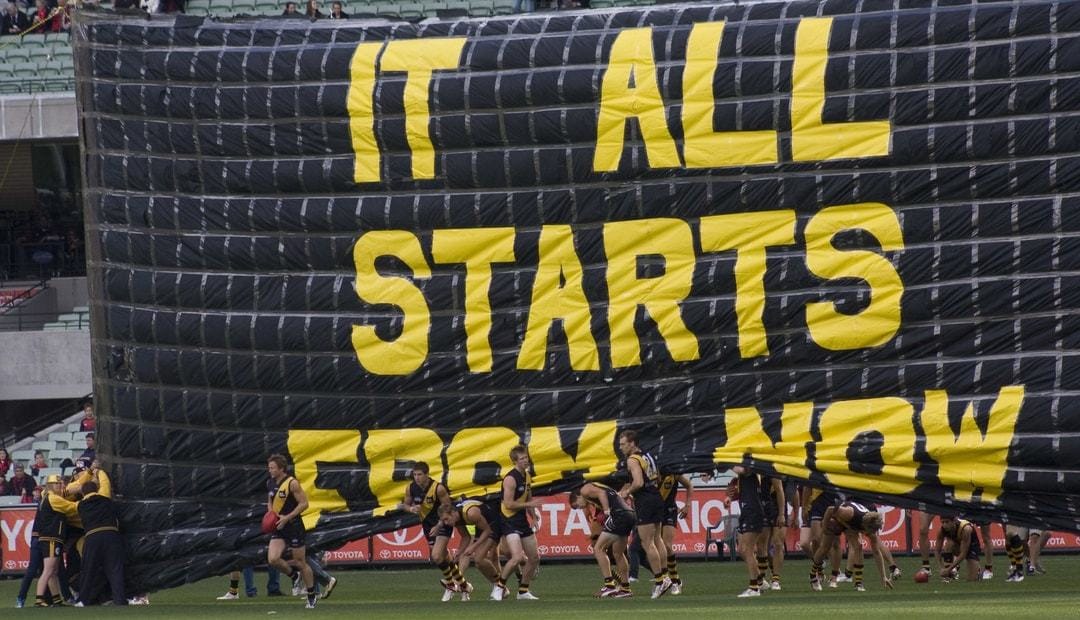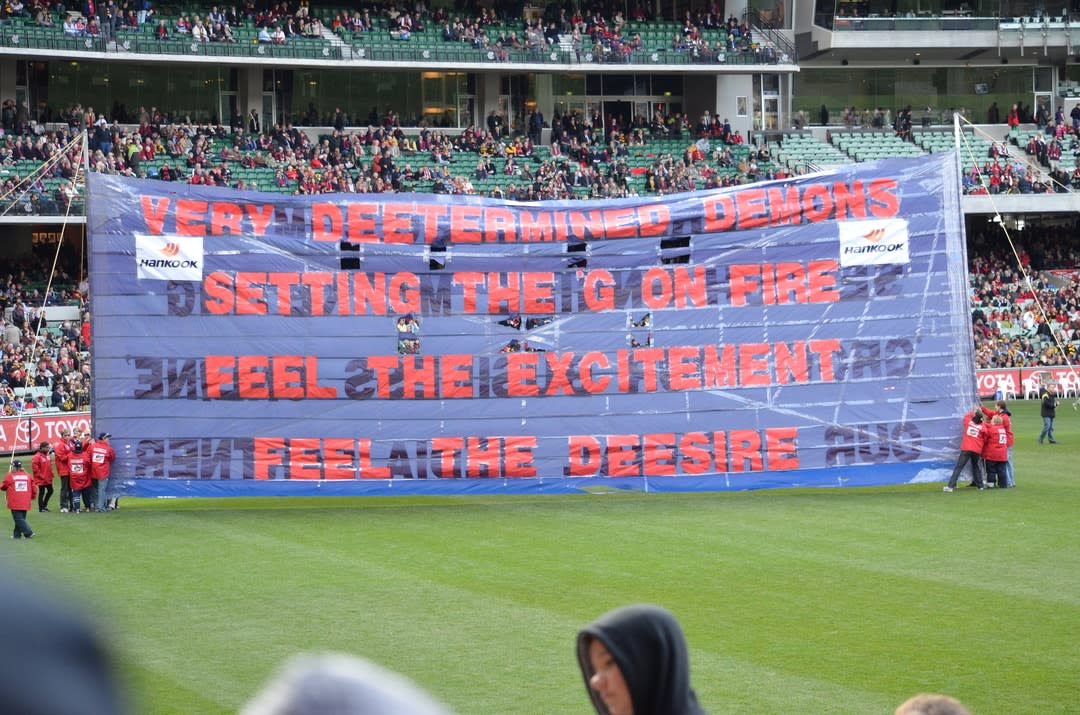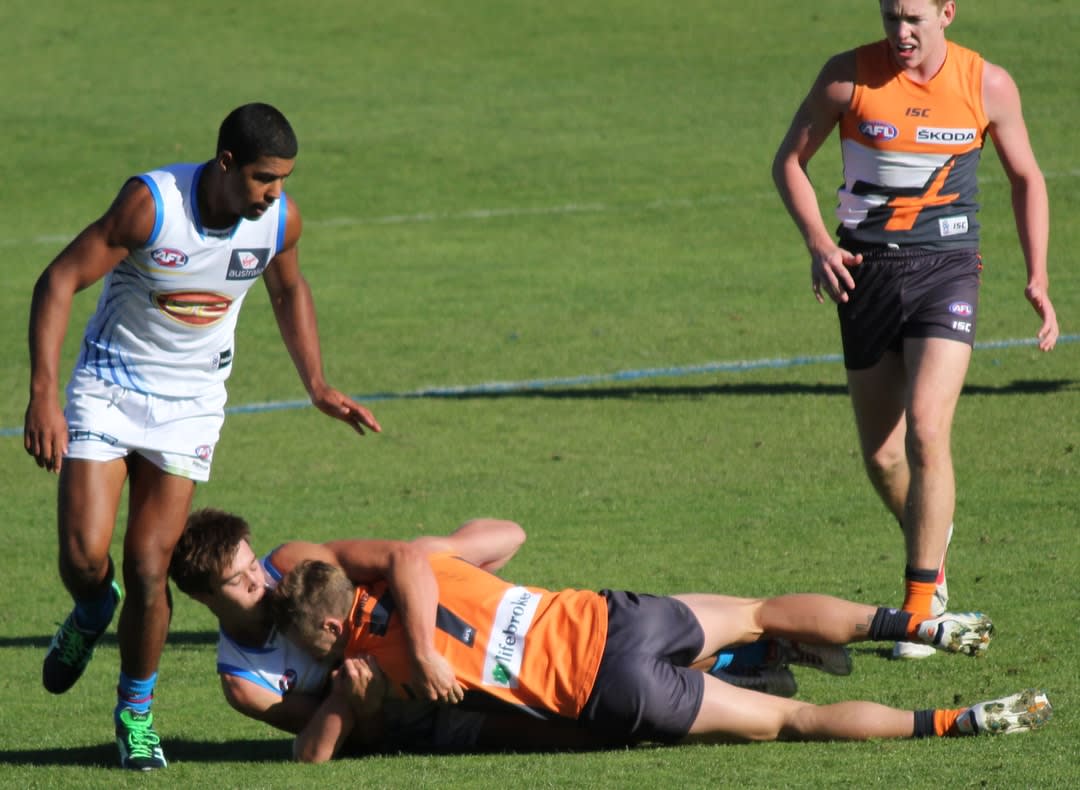
The wait must feel interminable. It’s been 55 years since Melbourne fans celebrated winning the VFL/AFL premiership – not that they need reminding theirs is the longest current drought. In 1964, the Norm Smith-coached Demons won their sixth flag from eight grand final appearances in 11 seasons, but no one could have predicted it presaged such a long success-starved era.
Melbourne players, administrators and supporters would thus be salivating in anticipation of the club’s next appearance on that last day in September (or October in 2020?), and all that's associated with arguably Australia’s greatest annual sporting spectacle.

Imagine what this experience would feel like for the club and its supporters if 2020 was the chosen year, even if a one-point win in round two against Carlton this past weekend would hardly inspire confidence?
The thought of a different grand final week in 2020 is heartbreaking and hollow for any diehard supporter, let alone the players, coaches and administrators. Will they be able to go and watch it live? Will the grand final parade go ahead? How will Brownlow Medal night look?
As the AFL continues to revise its strategy for the remainder of the 2020 season, it’s hard to fathom the long-term financial and social impacts that the COVID-19 crisis has wrought on this national industry.
The AFL is facing a collective debt in the hundreds of millions of dollars due to the COVID-19 pandemic. The impact to clubs has been just as brutal.
It was reported that only four clubs – West Coast, Richmond, Hawthorn and Collingwood – could be financially strong enough to survive a year without football. Others are rattling tins and appealing to their membership base for ongoing financial support in order to stay alive beyond 2021.
Fixing the fixture
Season 2020 is going to be like no other. But, the downtime has also highlighted many of challenges and opportunities the AFL needs to address to ensure the sport’s future viability.
With 18 teams and a 23-round season, a long-term issue for the AFL has been an uneven fixture in the sense that not all teams play each other twice.
This can result in some teams receiving "easy" draws, some hard draws, and some clubs copping top-quality opposition in consecutive weeks. Moreover, if crowds are allowed at grounds, with the home side keeping the cash gate, the calibre of the opposition can have significant effects on revenue.
Fixturing problems will become worse if the league conducts further expansion. Currently, two Melbourne-based clubs (North Melbourne and Hawthorn) play some of their home games in Tasmania, but the Tasmanian government is adamant the state could support a team.
Fixturing problems will become worse if the league conducts further expansion.
The current fixturing model is also an issue for poor-performing clubs. While every team wants to feature in the marquee Thursday, Friday or Saturday night prime-time slot, preferential treatment goes to the bigger clubs with larger supporter bases because they draw a larger viewing audience.
Could the AFL share its prime-time slots among all 18 clubs across a two-year period?
Not only could this strategy encourage greater fairness in the competition, and provide a welcome financial boost to the accounts of struggling clubs, but it would also give young fans across the country the opportunity to see their team in action on free-to-air TV.
Chronic underperforming clubs are an issue for the AFL. Giving AFL CEO Gillon McLachlan sleepless nights would be the Gold Coast Suns. The club, despite significant drafting and salary cap concessions, has failed to make finals or attract decent crowds. At the same time, it's sucked millions of dollars of investment from the AFL coffers – $27.5 million last year alone.

Despite these setbacks, having the Gold Coast Suns, and Sydney’s GWS Giants, in the competition is a bonus for the AFL, principally because it provides for a nine-game round – one extra televised game. The AFL only needs to attract a small proportion of supporters to boost overall network ratings and help grow the game in rugby league heartlands.
It also appears inevitable that a team from Tasmania, and potentially the Northern Territory, might enter the competition, and make the AFL truly national in the next couple of years. The AFL should kill off its China experiment and any other ideas to grow the game internationally. The International Rules series with Ireland also looks to be in peril.
The AFL should embrace the thirst and demand from players and fans alike to resurrect State of Origin football, but the problem is where to fit it in.
This could easily supplement the pre-season competition, taking the shape of a four-week, round-robin tournament, including a final at Marvel Stadium in the Docklands. Players not selected could easily continue in the pre-season competition and other intra-club matches.
Player drafting rules are a concern
Another issue of concern is the current player drafting rules, particularly the limited free agency rule. There's a push from the players for free agency to be granted after a shorter qualifying period.
The fear is that the draft will be undermined as players seek to transfer to strong clubs, on potentially short-term contracts, in the prospect of enjoying more success – similar to the models seen in American leagues such as the NFL and NBA.
However, having the ability to move clubs as a younger player – especially to weaker teams in the hope of getting more playing time – might encourage other players of a similar ilk to also shift and build their playing stocks in the hope of achieving on-field success in the longer-term.
The biggest talking point over the next decade will be risk management strategies around concussion and repeated head knocks.
Will any lessons from the US experience materialise, or is our game too different? It’s too early to tell.
Fans also don’t like the rules being tweaked. However, the biggest talking point over the next decade will be risk management strategies around concussion and repeated head knocks.
The AFL needs to ensure player safety, both within the game, and long after retirement. Since 2017, the NFL has paid US$714 million for brain damage sustained by more than 1000 current and former players.
It will be tricky for the AFL to maintain the attractive features, hard contests and toughness of the game, while maintaining player safety. Does the bump go? How will umpires adjudicate tackles?
The best-laid plans ...
Despite the best intentions of the AFL to create a more attractive game, the rule changes – including the 6-6-6 structure – have actually raised the defensive skills of teams, and lowered scores.
While games are getting closer and experiencing more lead changes, fans (and the AFL broadcasters) yearn for games of the 1980s and 1990s, when 40 or more goals would sometimes be kicked between the two sides.
The AFL has a golden opportunity to secure an upset, come-from-behind victory against the COVID-19 pandemic. This hiatus in the season could provide the perfect time for the AFL administration to cast its eyes across the future of the game so players, broadcasters and fans can all win from the game’s national growth.
And, hopefully, those long-suffering Demons fans will have something to cheer about before too long.
Ross Booth and Robert Brooks have both written extensively on Australian rules football for more than 25 years. Their most recent contribution, "The Economics of Australian Rules Football", was published in The Sage Handbook of Sports Economics in 2019.





